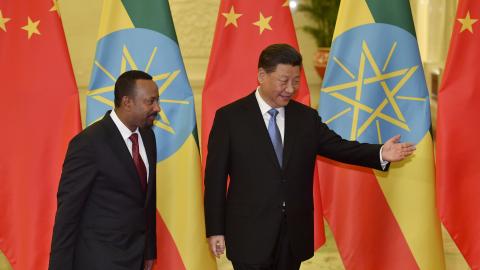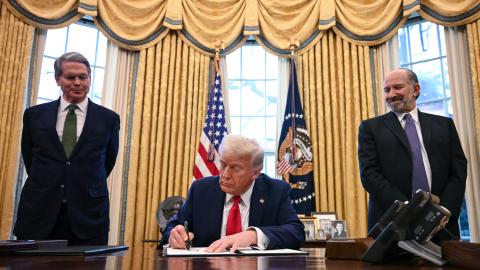The fate of American industrial icon Westinghouse is now in the hands of regulators, now that the Southern District of New York Bankruptcy Court has approved its reorganization plan.
Last year, Westinghouse, the leading U.S. nuclear power technology firm, was forced into bankruptcy by massive cost overruns in building the newest generation nuclear electricity plants in South Carolina and Georgia. Since 2006, the firm had been owned by Toshiba, which lacked the financial resources and the will to rescue it, especially since Japan itself is phasing out commercial nuclear power. Now the only obstacle in the way of the breakup of the firm and sale of its nuclear business is review by U.S. regulatory authorities.
In a world of rapidly increasing nuclear proliferation and growing strategic challenges from China and Russia, U.S. authorities should take a closer look at the fate of Westinghouse. Without such scrutiny, the company will likely be acquired by Brookfield Asset Management, a highly successful Canadian property management and development firm with scant experience in industry, let alone nuclear power. What’s more, Brookfield has no obligation to address geopolitical problems such as nuclear proliferation.
Despite the hopes of some industrial powers — such as Japan, Germany, and South Korea — and countless non-profits and advocacy groups, nuclear power will not disappear this century, barring some catastrophic disaster. Nuclear power emits no greenhouse gases and provides over 20 percent of electricity in the United States, 49 percent in France, 9.5 percent in the United Kingdom, and 12 percent in Japan. It is true that fossil fuel plants are cheaper to build and in many cases cheaper to operate than nuclear power stations. But the latter will have a role to play, especially for baseline power generation, at least until technology breakthroughs allow non-fossil renewables to fully replace fossil fuels at reasonable prices.
While much of the West (and the Pacific Rim) seeks a path to a carbon-free and nuclear-free future, the developing world marches ahead with plans for massive new investments in power for generating electricity and desalinizing sea water. With Japan and Korea lowering their nuclear ambitions, France’s Areva needing yet another massive government bailout, and Brookfield and Westinghouse stating their intention to exit the nuclear power plant construction business, the field is open to Russian and Chinese firms.
New plans for scores of nuclear-generation plants in Saudi Arabia, the United Arab Emirates, China, and India raise the prospect of dominance by Russian and Chinese actors. Russia already accounts for 60 percent of new global reactor sales, with a total value approaching $300 billion. China, which is becoming dominant in its own market and expanding its reach globally, is building a plant in the United Kingdom. The Russians have contracts to build in NATO allies Turkey and Hungary as well as in NATO-aspirant Finland. The presence of Russian and Chinese workers along with loans and grants to finance construction create opportunities for economic and political influence, which the Chinese have adeptly exploited in Europe and elsewhere.
The Westinghouse program to supply nuclear fuel to Ukraine and other East European countries to help them reduce dependence on Russian supplies is already faltering, potentially leaving this region even more dependent on Russia to meet its energy needs. The United States, under the seemingly unconcerned leadership of President Obama and Secretary Clinton, sold over 20 percent of its uranium extraction capacity to Russia, further undermining our ability to offer East Europeans and others an alternative.
Without a significant U.S. alternative, the major issue becomes the potential for nuclear proliferation. None of the other major world players, including the rogue states of Iran, Pakistan, and North Korea, has a history of strict adherence to non-proliferation agreements or norms. Since the biggest new customers, especially Saudi Arabia and India, have longstanding grievances with existing nuclear powers, the potential for proliferation on the Iranian model should be cause for concern. Absent the influence the U.S. can bring to bear in the context of a developer and provider of civil nuclear power systems, we will have little ability to influence the behavior of states that acquire civil nuclear power from China or Russia. As occurred with Iran and North Korea, states seeking to convert their civil nuclear power plants into facilities for producing fissile material for nuclear weapons will face less resistance than they might have if the United States had been a major actor in the field.
If the United States exits the construction business, there is also a danger it will lose technology leadership and nuclear power engineering and manufacturing skills used in military and civilian applications. We should not underestimate how few skilled workers the U.S. has for specialized tasks such as precision pipe-fitting and welding. Abandoning power plant businesses will only exacerbate existing shortages. The loss of manufacturing capacity will of course have large economic and national security implications. Using nuclear energy to generate electric power in the United States makes it possible to mitigate and hedge the risks that other types of fuel will not be available to meet domestic needs. New sources of energy for electric-power generation take decades to develop, install, and operate. Moreover, fuel diversity remains the most constructive approach to dealing with the long-term dynamics of energy supply.
Given these concerns, it would be prudent for U.S. national security authorities to perform a serious evaluation of the costs and benefits of allowing the Westinghouse sale to proceed. Economic authorities involved with the Committee on Foreign Investment in the United States (CFIUS) process should also possibly be involved, since the proposed purchaser is not American. Invoking a CFIUS review would likely irritate our Canadian allies at a sensitive time. But they are aware of such procedures and accustomed to working with sensitive defense-technology constraints; a review would provide an occasion to mitigate these concerns.
A CFIUS review of a Canadian purchase of Westinghouse could produce a constructive mitigation arrangement of the sort the Department of Defense employs for around 200 foreign entities. Canada has a long history of collaboration with the United States on nuclear matters and is a trusted security partner. The surviving elements of Westinghouse in the U.S. could be required to negotiate a Special Security Agreement with the DOD or Department of Energy, which could shape a long-term U.S.-Canadian relationship supporting energy diversity and security. (Some conditions to address the loss of U.S. technology capabilities might also be required.) Westinghouse would remain largely domiciled in the United States, and European fuel-supply operations would continue under the existing ownership structure.
We should also be realistic about the likely cost of keeping Westinghouse competitive and keeping it in business. Westinghouse failed in the marketplace, albeit in an environment of panic about nuclear power and very stringent regulatory burdens. Creativity will be needed to make it successful in the future. Some parts of the Trump administration, such as the DOE, are at least exploring. Last fall, Secretary of Energy Rick Perry announced an additional $3.7 billion in loan guarantees for the Vogtle power plant in Georgia, the last new U.S. commercial plant in recent decades, which happens to employ the most advanced Westinghouse design.
Allowing Westinghouse to be purchased by a foreign group with little experience in the industry and to be broken up and removed from the full-service and global nuclear-power market would have serious implications for national security and the economy. Of course, a review by CFIUS or the National Economic and Security Councils might determine that it is not worth the cost or the effort to find more effective alternatives. But such a review should at least be undertaken. Russia and China are waiting to fill the vacuum if Westinghouse exits the market.


















